Yangon – Myanmar – 27th August 2013 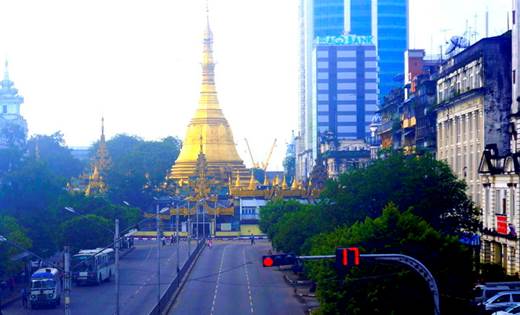
The Sula Paya Pagoda in Yangon Steady streams of foreign investors are pouring into Burma There are very few big cities left in Asia, where from a top floor vantage point you can still see tops of palm trees, and boats plying along the river. Yangon still has this view, a skyline not of concrete towers, but marked out by colonial architecture, and golden Buddhist Stupas; but it won’t be for long. Construction cranes now swing across newly cleared patches of ground all over the city. Its’battered old roads are now clogged with recently imported cars. And in stylishly renovated old buildings, there are new bars and restaurants, feeding an eclectic crowd of NGO workers and Burmese entrepreneurs and foreign venture capitalists. They call Myanmar the last untapped opportunity in Asia. A market of 60 million people in need of pretty much everything. Those brave enough to jump in first, or so goes the thinking, will reap the richest rewards. But just who is getting rich in this new buccaneering frontier? The biggest numbers have been the Japanese. You cannot move about in Yangon without bumping into yet another coach load of Japanese businessmen eagerly taking notes and snapshots. Every week, there is another grand announcement from corporate Japan, a planned factory here, a new power station there. The Government in Tokyo is throwing aid at Myanmar, offering to upgrade anything from its railway to its National Grid. While the country was under international sanctions, Japan had to grit its teeth, watching whilst its arch rival, China, courted the then military government for deals and favours. You get the strong impression now that Japan is rushing in now, to make up for those lost years. Rushing in, but not with much actual cash yet. “The Burmese call us NATO, No Action,Talk Only, Talk before, Leave and Learn.” (says the Japanese Business man talking to Jonathan Head, the author of this article on BBC’s ‘From our Own Correspondent’. There are almost constant trade missions, 18 smaller companies, The Lord Mayer of London, just the other day. But no real investment – Why not? There are basic infrastructure problems. Myanmar is chronically short of electricity. One Garment manufacturer I met the other day showed me 15 generators he has to run for the frequent black outs that happen. But he explained that his fuel costs are so high that even with the lowest wages in Asia, it’s a struggle to make a profit. Then there’s the shortage of feasible buildings. As a result the rents for downtown buildings in Yangon are as high as in New York and much higher than in neighbouring Bangkok. There’s confusion over the rules of doing business too. The banking system is so primitive that deals often have to be done with bags full of cash. The same problems confront Burmese businesses. But after living for so many years under the suffocating blanket of military rule, their attitude is ebullient. I found myself sitting one evening with a group of well heeled women, in a luxury spa, sipping champagne, and listening to their business triumph. One woman had left school at 17 to help bring up her younger brothers. Today she is a brand manager for a European Cosmetic giant. Another young entrepreneur I met had recently returned from Britain to help run a multi million investment fund, but has decided to develop a mobile banking service as well, in a country where mobile phones have become available even before most people have no internet, let alone enough electricity. His office sits in a half built technology park, surrounded by tress and lots of mud. And there was the 27 year old Thierry, who runs a phone shop, and has loads of ambition. She told me that she is taking classes for 2 hours every evening after work. It is all very up-lifting, reinforcing the impression of a country that wants to move on. But it is only a small fraction of Myanmar’s people that are riding this wave. A boat ride across the vast flood plain of the Irrawaddy River, brought me to a temple school, funded by a donation from NGO’s and entirely surrounded by water. 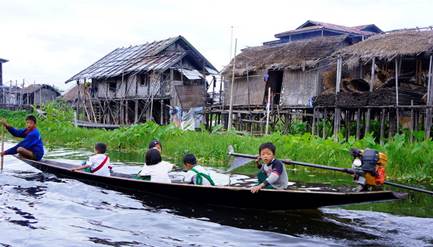
The children paddle to class in dugout canoes. But before it was built last year, the children did not go to school at all during the rainy season. Their parents are farmers and labourers. Their village has no electricity, and little in the way of healthcare. I ask the Abbott of the temple what all the changes in the country meant to him. I let him think for a second. ‘Well nothing’ he said, ‘except for this school. That’s all we got’.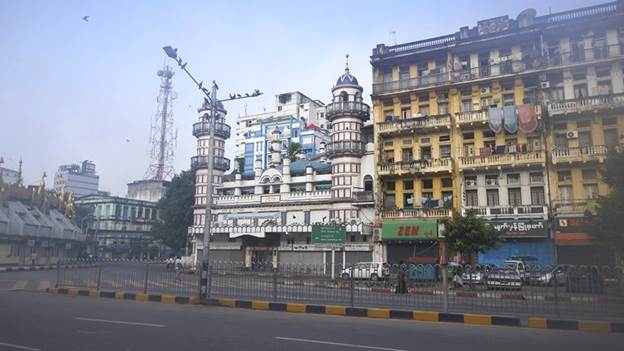 Meanwhile, we see no presence of Muslims in Yangon, or anywhere else during our travels. We see the Bengali Sunni Jamesh Mosque in Yangon (above) , but no women in veils as we do frequently in Phuket. Below is the extract I have taken from www.genocidewatch.org/myanmar written in October 2013 The violence has occurred in the context of rising Burman-Buddhist nationalism, and the growing influence of the monk-led “969” movement that preaches intolerance and urges a boycott of Muslim businesses. This is a dangerous combination: considerable pent-up frustration and anger under years of authoritarianism are now being directed towards Muslims by a populist political force that cloaks itself in religious respectability and moral authority. (read more) On 5th December, 2013, our local Phuket Gazette newspaper issued a report on the horrendous way these displaced Muslims from Myanmar are being treated as they are picked up by the immigration authorities in Thailand. Rohingya are Muslims from Myanmar and Bangladesh, where they are usually stateless and despised as illegal immigrants. Since 140,000 0f them were made homeless in 2012, after two eruptions of violence between Rohingyas and majority Buddhists in Rakhine State in western Myanmar killed at least 192 people. There are so many of them, that a ‘Plan 2’ has been taking place, where men,, women and children squeeze aboard overloaded fishing boats and cargo ships to cross the Bay of Bengal. Their desired destination is Malaysia, a Muslim-majority country where at least 31,000 Rohingya already live. Many of these refugees were waylaid in Thailand, where the Thai navy and marine police worked with smugglers to extract money for their onward trip to Malaysia. The Thai Minister of Social Development and Human Security declared the detention and trafficking of Rohingya through Thailand to be the subject of clear human rights issues and a national security threat. A huge amount of overcrowding is causing them to become prey to Human Trafficking. The outlook is not looking good for these people. The US State Department’s annual Trafficking in Persons (TIP) report ranks countries on their record for combating the crime. Thailand will be threatened by U.S. Sanctions if it does not make significant efforts to eliminate this human trafficking. This would cause them a major embarrassment, which is now lobbying hard for a non-permanent position on the UN Security Council. 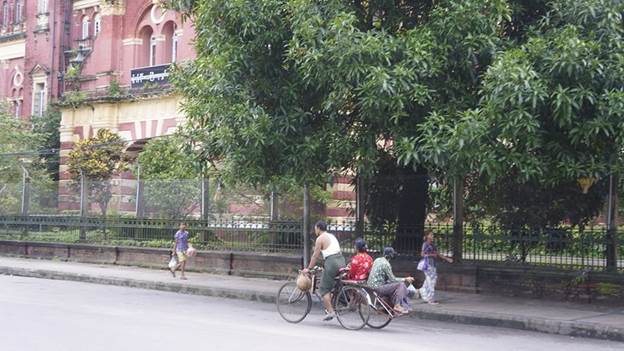
Tricycle taxi taking women through town 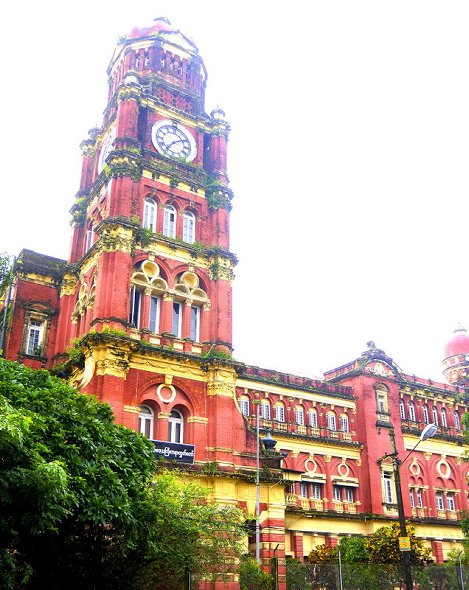
The British High Court Clock Tower, now used by the Burmese Government 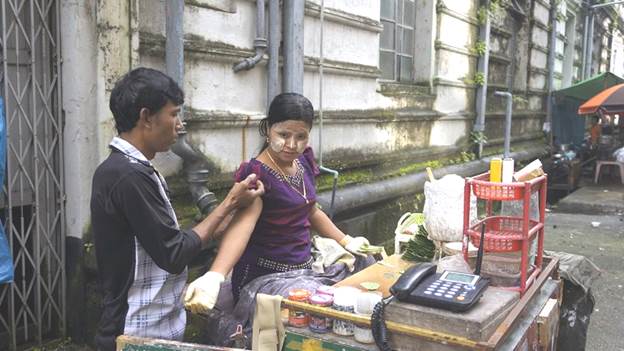
This lady is being given an injection of what? She has a telephone line on her stand, which she can hire out for calls to mobile phones for those people who do not yet own one. We could not obtain a SIM card for our mobiles, unless we took out a year’s subscription. No SIM cards were available anywhere in Bangkok for us to be able to buy! Notice the moss invasion of all the old colonial buildings in this street, adjacent to the ‘Strand Road’ the main harbor front road of Yangon. 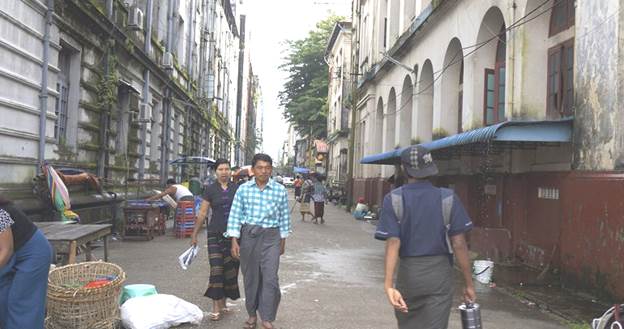
People going to work carrying their lunch in the 3 metal canisters clipped together 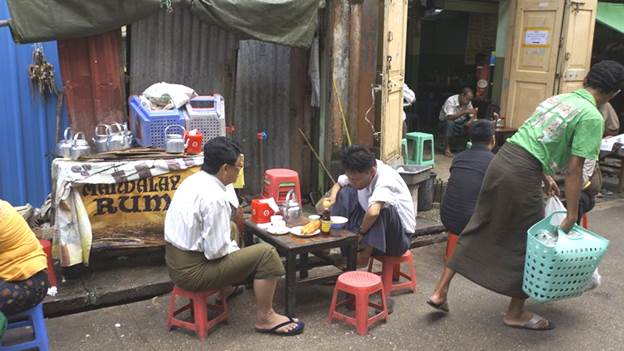
8a.m. Breakfast on the street time 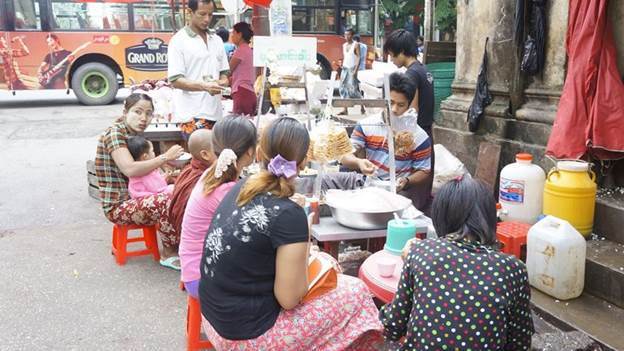
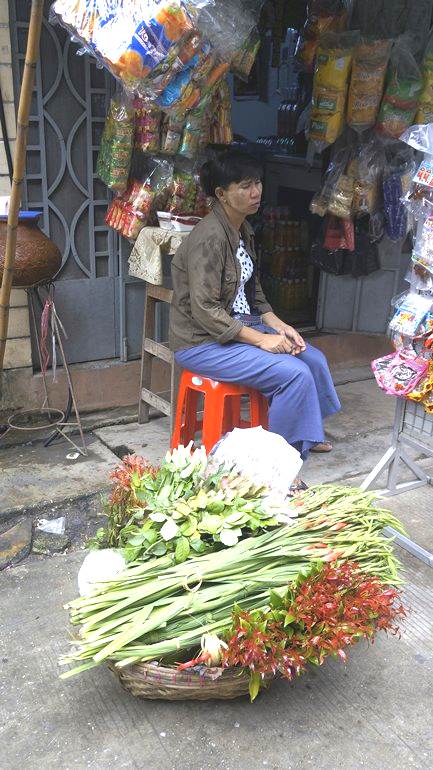
Flower for offering at the Buddhist shrines 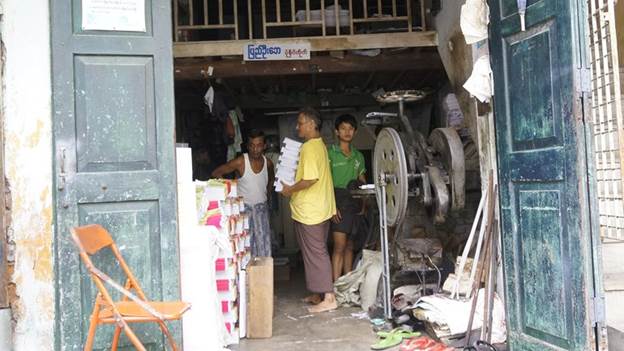
Old Printing Press at work 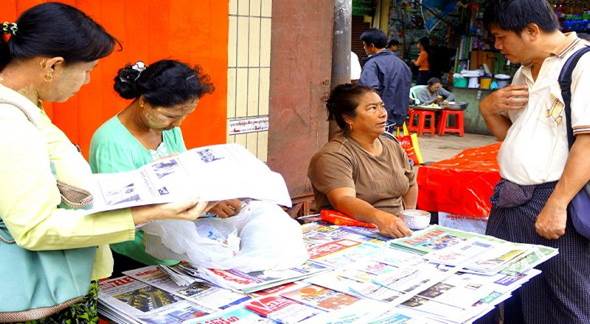
People are delighted to be able to have access to uncensored news at last! 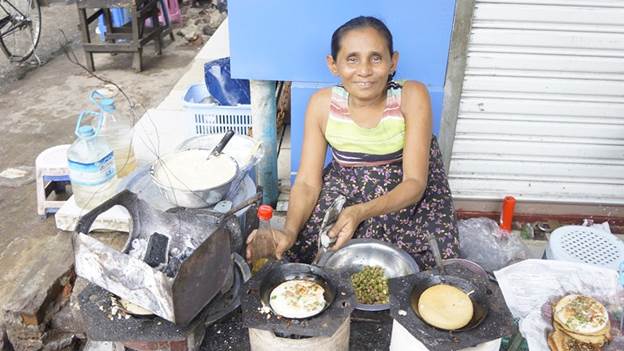
Chapattis for Breakfast too 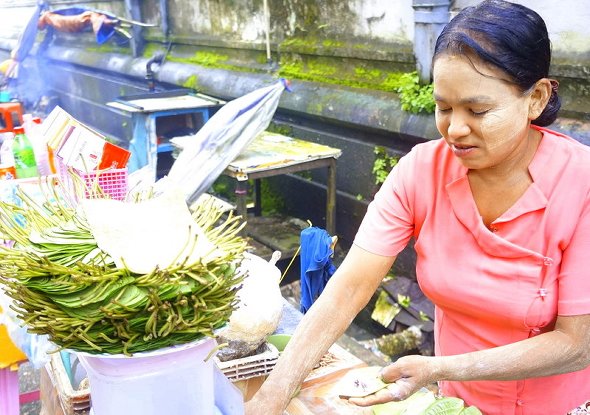
This lady is making up the ‘cheroots’, tobacco, lime wrapped up in a leaf 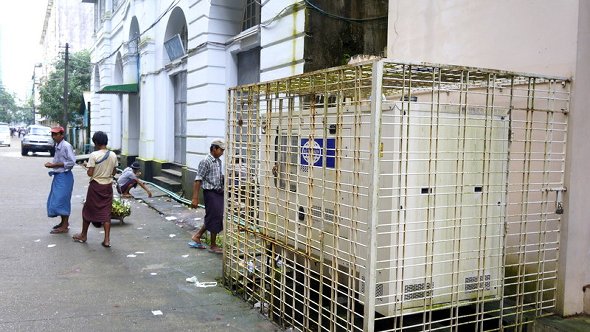
There are many generators like this well secured one outside the buildings, as the power cuts are so frequent, businesses need alternative power 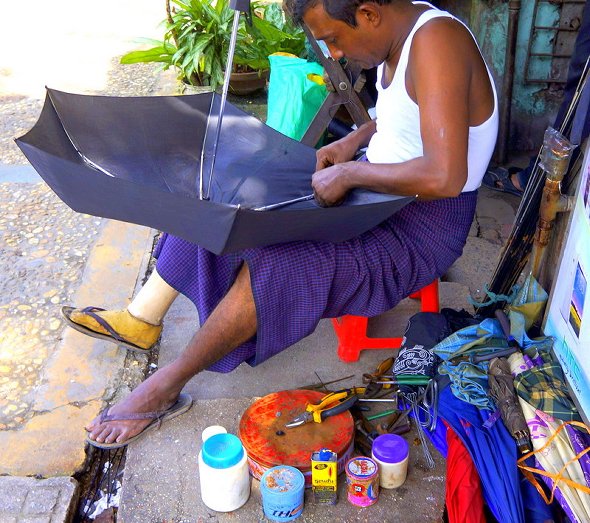
One good business is mending umbrellas/parasols, brain power needed! Note his prosthetic leg – probably from a mine in farmland? 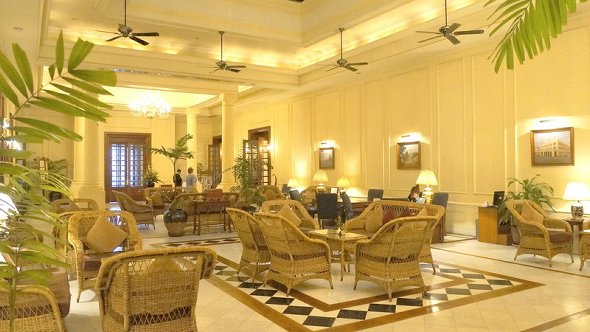
The contrast to the poverty is the luxurious ‘Strand Hotel’ in the street of the same name. We stayed at the ‘Traders’ Hotel’ otherwise known locally as the ‘Traitors Hotel’ as it was where people were pointed out to the Government officials as being ‘trouble makers’. 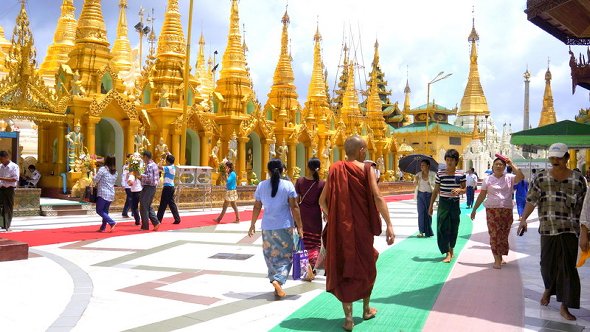
Entrance to the Schwedagon Pagoda 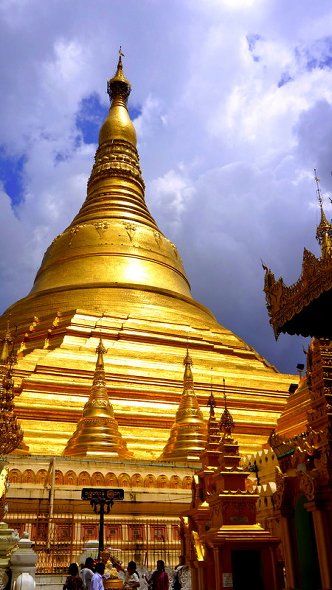
Shwedagon Pagoda, Yangon, One of the world’s largest Buddhist temples Is 2,500 years old. Many layers of gold are painted on to it and its’ surrounding shrines 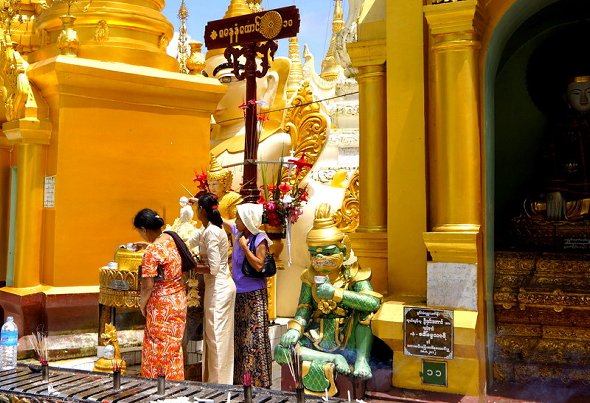
The shrines are placed North, East, South and West, and people know according to their birth date which shrine they can make offerings to 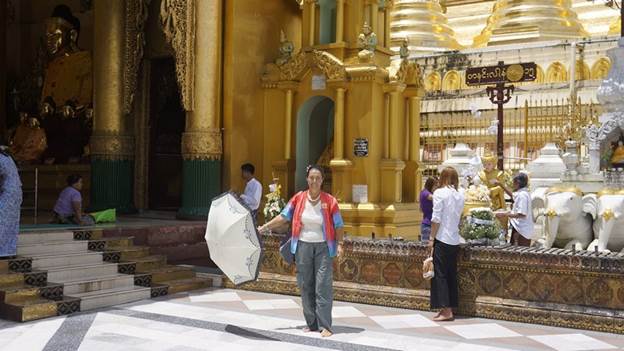
This is my one, the Western shrine 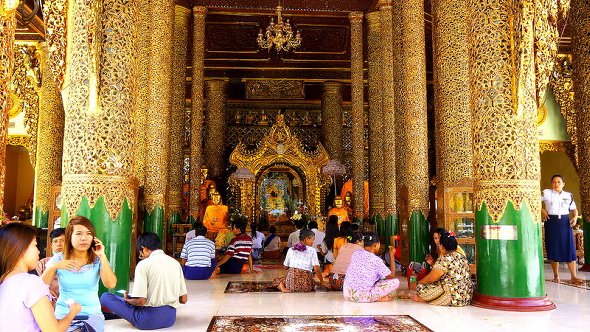
People sit in the shade in the shrine and make mobile phone calls, and generally enjoy having a chat after making their prayers | 
